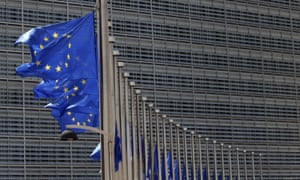A change to free movement could persuade the British public to vote again. And it can be done: treaties that stand in the way of reality have been changed before.
EU flags flying at half mast at the European commission to mark the Bastille Day attack. ‘As Donald Tusk declared before the referendum, the EU needs to take a “long hard look at itself and listen to the British warning signal”.’ Photograph: Darko Vojinovic/AP
How should Britain leave the European Union? The question hangs over Theresa May’s new administration as it considers when to invoke article 50, which will lay out the procedure for a withdrawal agreement, and indicate what sort of future relationship Britain wants with the EU.
Will it be membership of the European Economic Area, like Norway? A trade agreement with the EU, or reliance on World Trade Organisation rules? Yet the future relationship depends not only on the conditions in Britain but also on developments in the EU. And in that respect there are encouraging signs that European leaders are, at long last, listening to what their peoples have been telling them.
As Donald Tusk, president of the European council, declared before the referendum, the EU needs to take a “long hard look at itself and listen to the British warning signal”. After the vote for Brexit, that is needed more than ever. During the campaign much was made of the dangers of an overweening Europe, aiming to become a federal superstate. Yet things have changed following theeurozone and migration crises.
How should Britain leave the European Union? The question hangs over Theresa May’s new administration as it considers when to invoke article 50, which will lay out the procedure for a withdrawal agreement, and indicate what sort of future relationship Britain wants with the EU.
Will it be membership of the European Economic Area, like Norway? A trade agreement with the EU, or reliance on World Trade Organisation rules? Yet the future relationship depends not only on the conditions in Britain but also on developments in the EU. And in that respect there are encouraging signs that European leaders are, at long last, listening to what their peoples have been telling them.
As Donald Tusk, president of the European council, declared before the referendum, the EU needs to take a “long hard look at itself and listen to the British warning signal”. After the vote for Brexit, that is needed more than ever. During the campaign much was made of the dangers of an overweening Europe, aiming to become a federal superstate. Yet things have changed following theeurozone and migration crises.
Despite the rhetoric of ever closer union, the member states are no longer prepared to sacrifice more of their sovereignty. Germany has no appetite for fiscal union, and Wolfgang Schäuble, Germany’s finance minister, has said that integration has gone “too far”. Poland has no wish to adopt the euro; there is clearly little desire for a common migration policy; and anti-EU feeling is growing throughout the continent. The EU has become economically, politically and culturally too diverse for any drive towards ever closer union to be successful.
More often than not, a political union of separate states requires an act of will brought about by force or an external threat – as with the United States in the 18th century and Germany in the 19th. The EU is in no position to produce such strength of feeling, so it seems certain to remain an association of states committed, as the European federalist Andrew Duff has lamented, to “never closer union”. The trend towards intergovernmentalism rather than supranationalism – where a power greater than the states takes control – was vividly illustrated when the eurozone crisis was handled largely by the council, made up of EU heads of governments, rather than the commission, which has the sole power to initiate laws.
The EU must now face reality. That means formally recognising the council as the supreme executive of the union, downgrading the commission so that it becomes, as the Gaullists have long wanted, a secretariat of the council without the power to initiate legislation. That would undermine the arguments of Eurosceptics, who thrive on the anathema of an unelected and unaccountable legislative body, something that Britain found particularly difficult to accept.
Further, so long as the idea of “ever closer union” remains enshrined in the EU, it will give eurosceptics a handle for criticism; and it allows the European court of justice to extend its remit too widely. The court should be an arbiter, not a missionary to eliminate states’ rights. So the EU must state clearly that ever closer union is unlikely to occur in the foreseeable future.
The EU must also face reality on freedom of movement. That principle was first outlined in the 1950s in conditions very different from those of today, by six member states at a similar stage of economic development and before the era of inexpensive mass transit. It is no longer suitable when Europe consists of 27 member states at very different stages of economic development. It not only imposes strains on the more affluent countries, stimulating the growth of the radical right, but also deprives the less affluent members of their most able and energetic citizens. Modifying this principle would also help Britain to negotiate continued access to the internal market.
It is said that the treaties preclude any interference with freedom of movement. Yet treaties intended to enforce the stability and growth pact, designed to limit the power of national governments, have been disregarded when necessity required. Adoption of the euro was supposed to be irreversible; yet, it is claimed Schauble urged Greece to abandon the euro and leave the Eurozone. Treaties, after all, are human constructs. If they stand in the way of reality, members can and should agree to revise them.
The EU needs not only long-term reform but also immediate measures to prove its value to the ordinary citizen. Tusk has rightly said that Europeans want not more Europe, but better Europe. Many Europeans have benefited from the single market, most obviously in cheap airfares – now, as the banker Sir Martin Jacomb has argued, is surely the time for a radical extension of free market rules into the energy and digital areas, and an effort to ensure that professional qualifications are genuinely transferable across Europe. This would provide citizens with concrete benefits, which would do more than a host of declarations or institutional reforms to prove the value of the European project.

Frankfurt tries to tempt the bankers fleeing a post-Brexit Britain
The British contribution to Europe was always to insist that rhetoric is subordinated to reality. Realism is now desperately needed if the European project is to be rescued from the elitist and technocratic establishment which currently dominates it, and which is losing it the support of its people. Perhaps if EU leaders listen to what citizens are saying, it might even be possible to persuade the British public to have second thoughts in a second referendum.

No comments:
Post a Comment